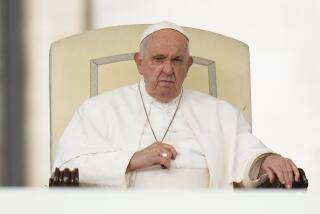Warsaw archbishop who spied for communists quits
- Share via
WARSAW — A national drama that has embarrassed the Roman Catholic Church and roused Cold War memories ended in spectacle Sunday when the new archbishop of Warsaw resigned before his inauguration Mass after admitting that he had collaborated with communist secret police decades ago.
The Vatican quickly accepted the resignation of Archbishop Stanislaw Wielgus, who waited until hours before a ceremony in St. John’s Cathedral before capitulating to public pressure for him to step down. Pope Benedict XVI, who until last week supported the archbishop, asked Wielgus’ predecessor, Cardinal Jozef Glemp, to act as a temporary replacement.
Polish radio reported that the pope urged Wielgus to relinquish his post after he did not fully disclose his relationship with the former communist state. Papal spokesman Father Federico Lombardi told Vatican Radio that Wielgus’ behavior “in past years during the communist regime in Poland gravely compromised his authority.”
Lombardi added that Wielgus made the right decision to resign “despite his moving and humble request for forgiveness.”
Nation is shaken
The religious and political furor around Wielgus has shaken this overwhelmingly Catholic nation. The church and the late Pope John Paul II, a Pole, defied decades of communist rule. Glemp also has been revered as an anti-communist, and his reinstallation was viewed as an astute move to bolster the image of the Catholic Church’s leadership in Poland.
The televised scene in the cathedral Sunday morning was mesmerizing. Wearing a miter and gold vestments, Wielgus stood before a congregation of dignitaries and friends, including Polish President Lech Kaczynski. With a pained expression, the archbishop, who reportedly had spent the night consulting with Vatican officials, read from the letter of resignation he sent to Pope Benedict.
“After reflecting deeply and assessing my personal situation,” Wielgus said, “I submit to the hands of Your Holiness my resignation from the post of archbishop of Warsaw.”
Some people in the church cheered; others shouted, “No, no, stay with us.” What would have been an inauguration Mass was improvised into a Mass of thanksgiving for the long tenure of Glemp. Outside, protesters waved banners stating that “we cannot allow” Wielgus’ appointment.
On Friday, the 67-year-old archbishop acknowledged that he had “harmed the church” by his association with secret service agents, which began in the late 1960s and was formalized in 1978 when he signed a document while seeking permission to travel to Germany.
He added: “I confess to the mistake by me years ago, just as I have confessed to the Holy Father.” He insisted, however, that “I never informed on anyone and never tried to hurt anyone.”
‘Gordian knot’
The archbishop’s entanglement was reported in the media shortly after the Vatican selected him in early December. A review of communist-era files by Poland’s Catholic Church Historical Commission concluded: “There are numerous, substantial documents confirming Stanislaw Wielgus’ willingness for a conscious and secret cooperation with the Communist security forces.”
Tomasz Terlikowski, a religious affairs commentator, said he was “relieved” the Vatican reacted so quickly to cut this “Gordian knot.”
Commentators said the passions for and against Wielgus revealed the deep divisions within a church that for Poles symbolizes both religious faith and national identity. The case represents the sensitivity former Eastern Bloc countries have faced since communism collapsed in 1989.
Secret files
Secret police across Eastern Europe kept hundreds of thousands of files on collaborators, many of whom never spied for the state but were nonetheless tainted. The disclosures about Wielgus came as Poland’s center-right, populist government was seeking to expose former communist collaborators.
Glemp said he was troubled that documents from decades ago, when interpreted through the prism of today’s Poland, may have unfairly characterized a fellow clergyman.
“A judgment has been passed on Archbishop Wielgus,” Glemp told the cathedral congregation. “What kind of judgment is that, on the basis of a couple pieces of paper, photocopied three times over? We do not want such judgments.”
Historians estimate that about 10% of Polish priests cooperated with communist agents, including the Rev. Mieczyslaw Malinski, who had close ties to John Paul. Many said Wielgus’ undoing was not that he met with the secret police, but that he attempted to hide the breadth of his involvement even as questions arose around his ascension.
*
Fleishman reported from Berlin and Kasprzycka from Warsaw.
More to Read
Sign up for Essential California
The most important California stories and recommendations in your inbox every morning.
You may occasionally receive promotional content from the Los Angeles Times.











